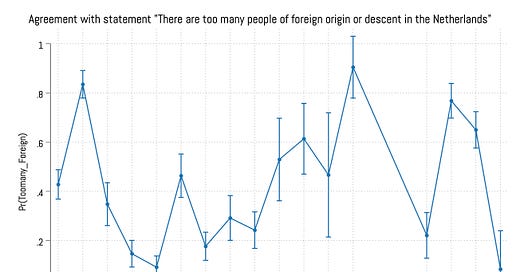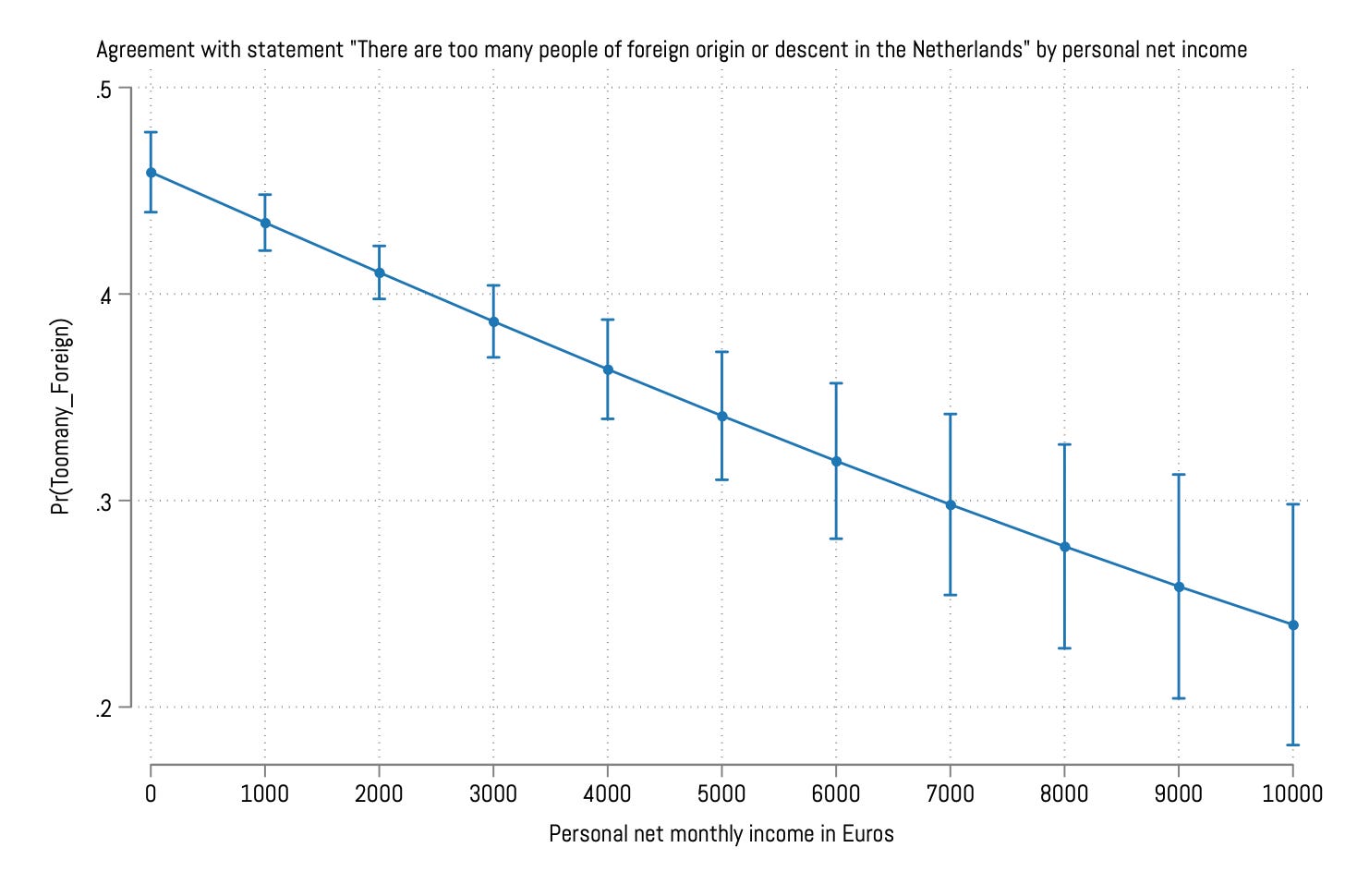#11 The Immigration Attitudes of Dutch voters
8 out of 10 PVV voters think that "there are too many people of foreign background in the Netherlands". Education is the main driver of immigration attitudes, in the Netherlands and elsewhere.
Immigration has featured prominently in the last Dutch parliamentary elections. It was disagreement about this issue that led the cabinet of Mark Rutte to fall last summer, and the main winner of this election was the Party for Freedom led by Geert Wilders, arguably one of the most prominent anti-immigration politicians in Europe.
But what are the attitudes of Dutch voters about immigration, and how do these attitudes break down across different groups of voters? I used the latest wave of the LISS panel, a large socio-economic panels in the Netherlands, to have a look at how immigration attitudes are related to different party and socio-economic factors. The latest wave was collected between December 2022 and March 2023. The wave has data on 6’157 individuals living in the Netherlands. There are a number of questions on immigration in the questionnaire, but I used agreement with the statement “There are too many people of foreign origin or descent in the Netherlands”1 as the main measure in the graphs below to capture general hostility towards immigration. As the wording indicates, this question doesn’t measure preferences about immigration inflows, but a general unease with the number of people with a migration background in the country. Here are a few results.
1. 83% of PVV voters think that there are “too many people with a migration background in the Netherlands”
Figure 1 shows the probability to agree with the statement “there are too many people of foreign origin or descent in the Netherlands”, disaggregated by voting intention between December 2022 and March 2023. For the whole sample, the percentage agreeing (to some or a large extent) is 42%. The graph is based on 2000 respondents who declared a voting intention. NSC, the new party set up by Pieter Omzigt, is not there. More than 8 out of 10 PVV and FvD voters agree with the statement, while a bit less than half of VVD voters do so. I showed probabilities in order to show confidence intervals. For some groups of voters, such as Denk (the party representing precisely people with a migration background), the average is surprisingly high but the sample is very small. One notable case is the SP, a left party whose electorate has similar levels of hostility to immigration than the right-wing VVD. This data, especially when it comes to the PVV, casts some doubts on recent assertions that these voters are driven by diverse fears and not only hostility to immigrants. There is wide agreement on this issue among people who declared a voting intention for Wilders.
3. Education is a strong correlate of immigration attitudes
We know from the political science literature that education is one of the main determinants of immigration attitudes: people with higher levels of education tend to be more favourable to immigration and ethnic diversity. This is also clearly the case in the Netherlands. People with a university degree are 76% less likely to agree with the statement above compared to people with a vmbo (pre-vocational secondary education) degree. Again, these are just descriptive results. I do not control for anything else (yet).
3. People on higher incomes are more favourable to immigration and ethnic diversity (but this relationship disappears once we control for education)
In line with the finding about education, which is usually correlated with income, the expected level of hostility to people with a foreign backgrounds tends to decline with income (Figure 3). However, as we will see below, this descriptive result mostly vanishes once we control for education.
4. Controlling for other factors, women are less hostile to immigration than men
So, what happens when we control for all these socio-demographic factors at the same time? I show the results of a multivariate logistic regression in Figure 4 below, with education, income, age and gender as independent variables and using robust standard errors. Well, clearly the main determinant is education. The impact of income mostly disappears, and so does age by the way. Interestingly, however, gender stays significant. Women are still less likely to display anti-immigration attitudes than men if we control for age, education and income.
In Dutch: “In Nederland wonen te veel mensen met een migratieachtergrond”






